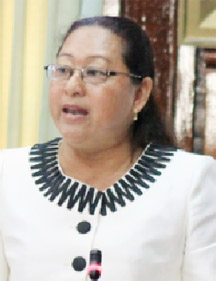There has been a “bottom up” approach to development in indigenous communities, Minister of Amerindian Affairs Pauline Sukhai told the National Assembly last Friday as she disputed the claims by opposition speakers that government has been dictating to the Amerindian people.
Sukhai stated that the Amerindian Development Fund will channel $350M to capitalise community development projects to be implemented in the villages over the coming year. “These projects were formulated by local villagers themselves,” the minister said, while adding that they were subjected to peer-reviews.

In her presentation to the budget debate, Sukhai dared members of the opposition to vote against this year’s proposed budget, while warning that the move will affect many Amerindians.
“…I dare the colleague of [APNU MP Sydney] Allicock to vote against the budget 2013—an act that will deny more than 15,000 Amerindian households vital intervention funds,” she said, while referring to APNU MP Ronald Bulkan who suggested that projects identified in the budget are not good enough for hinterland development.
Sukhai said Bulkan’s comment clearly reflects his inattentiveness to the new dispensation that obtains in the many villages and communities in the hinterland.
She noted that in the area of allocation of titles to Amerindian communities, Guyana has legislated the process and the state covers the cost for demarcation. “Currently Guyana today has 98 titled villages…making Amerindians the largest private land owners in Guyana,” she noted.
In addition, she noted that the proposed budget would provide for $77.9M to cover expenditure for titling 12 eligible communities. “…And I am only too willing to provide the go ahead to the Guyana Lands and Surveys Commission to conduct the national surveys to an additional eight titled villages that have approved demarcation of their village boundaries,” she added.
Sukhai also addressed the call made by Bulkan for sustainable development in Amerindian communities. On this point, she stated, “I noted the concerns of the honourable member Bulkan and his call that the hinterland economies are put on a sustainable path. I wish to point out that regions 1, 7, 8 and 9 are referred to as Guyana’s hinterland and that the population in these regions is mostly Amerindians. My response, therefore, will be confined to intervention and initiative undertaken by the Ministry of Amerindian Affairs in the context of the Low Carbon Development Strategy,” she said.
Sukhai also identified the National Hinterland Secured Livelihood Programme, where certain community projects were established and remain relevant for more than 200 farmers, as another initiative that speaks to sustained economic growth in indigenous communities.
“To date, these projects combined have benefitted from an allocation totalling $91M in the field of apiculture, aquaculture, cassava processing, pineapple processing, ginger processing, crab fattening and crab oil cosmetic line products,” she said.
However, she also acknowledged problems. “Over the last two years I must admit that the community experienced technical challenges in apiculture, aquaculture and [the] crab fattening initiative. We are working with the communities to correct and assist in this regard,” she added.
The processing of chunk pineapple, which will be exported, is expected soon and a cosmetic scientist from the US was engaged to enhance a safe value-added cosmetic product line from crabwood seeds.
Sukhai described the programme as a “bottom up approach,” which she said is commendable and diffuses comments she has heard in the National Assembly that consultations are deficient and that the government dictates to indigenous people.
In relation to education in the hinterlands, Minister Sukhai noted that approximately 30,000 school-age children have access to nursery, primary and secondary education, which is unprecedented in the country’s history. She also stated that plans to provide access to transportation and the expanding of dormitories are also on the agenda, while adding that their welfare service provides great assistance to communities and residents, thereby giving them an opportunity to register themselves.
More than 30,000 birth certificates for Amerindians were completed, she added, while mentioning that the previous government had left a poor legacy in this respect. “…If in the time of the opposition they could not afford the basic opportunity to indigenous people to provide them with a document of identity, then it tells a sad story on their part,” she said.





